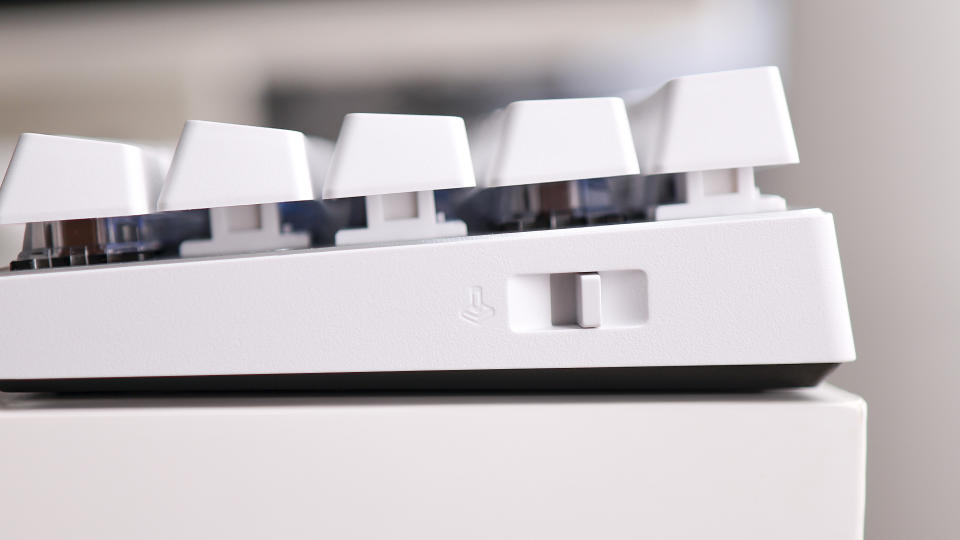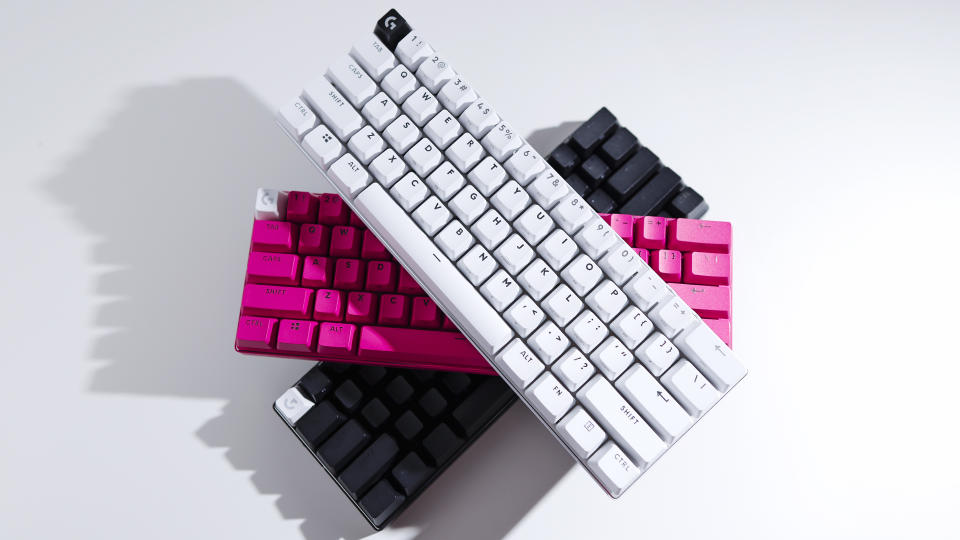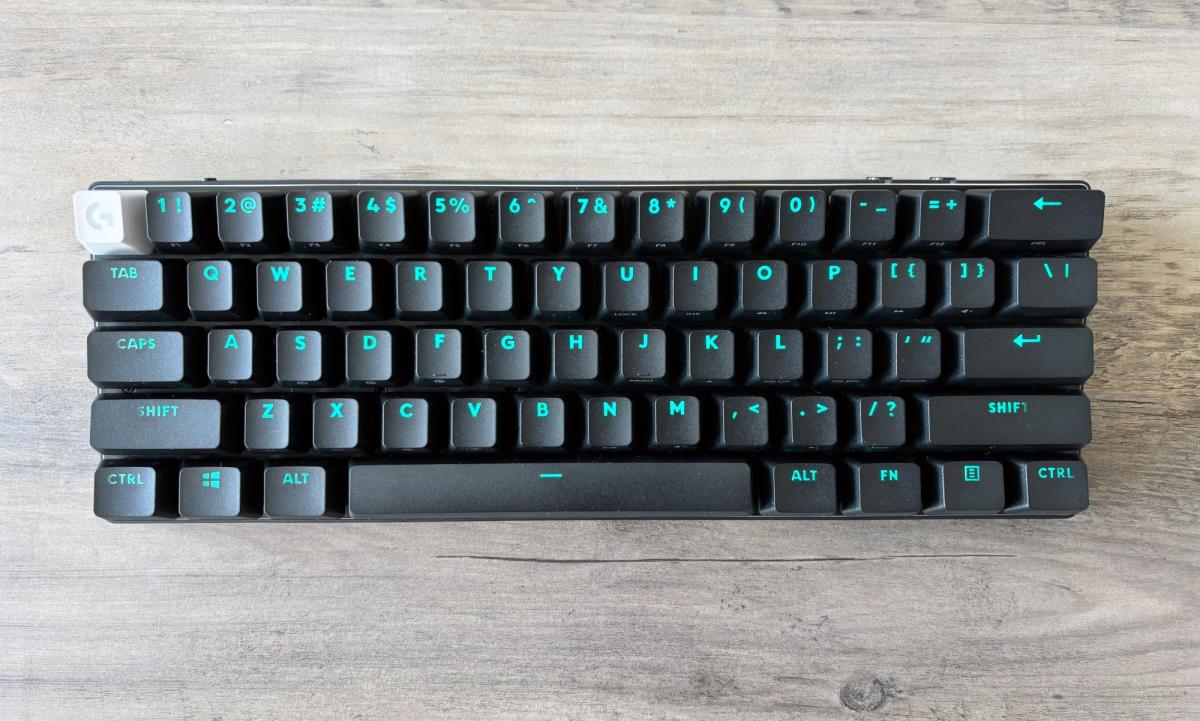Logitech has unveiled the G Pro X 60, its latest gaming keyboard. Similar to the peripheral maker’s G Pro X TKL from last year, this is a wireless model aimed at competitive-minded gamers first and foremost. Unlike that device, it has a smaller 60 percent layout, which means it lacks a dedicated function row, number pad, arrow keys and nav cluster but takes up much less space on a desk. This can be a boon for games because it leaves more room to flick a mouse around while retaining the most common action keys. Naturally, it’s also more portable.
The G Pro X 60 is up for pre-order today for $179 in the US or €229 in Europe. It’s available in three colors (black, white or pink) with either the linear or tactile version of Logitech’s GX Optical switches. The company says it’ll be available at major retailers in “late April.”
I’ve had the keyboard on hand for a few days prior to today’s announcement and have mostly been impressed, though I’d have a hard time calling it a great value.
Let’s start with the good: This thing is well-built. Its aluminum top plate is surrounded by a plastic frame, but it all feels sturdy, with no real flex or give when you press down. Its doubleshot PBT keycaps are pleasingly crisp and should avoid any of the shininess that’d develop with cheaper ABS plastic over time. The legends on the keycaps are neatly printed and transparent, so any RGB backlight effects you set will come through cleanly. All the keys are angled comfortably, and there’s a set of flip-out feet on the back.
I’m not crazy about the side-mounted volume roller — once you’ve blessed your keyboard with a full-on rotary knob, it’s hard to give up — but it’s easy to reach with your pinky, so you can adjust volume without having to lift your other fingers during the heat of a game. There’s also a dedicated switch for flipping on Logitech’s “game mode,” which deactivates keys you might otherwise hit by accident; those include the Windows and Fn keys by default, but you can add others through Logitech’s G Hub software.
The keyboard can connect over a detachable USB-C cable, Bluetooth or a 2.4GHz wireless dongle. Per usual with Logitech gear, the latter’s connection is rock solid; I’ve had none of the hiccups or stuttering I’ve seen with some wireless keyboards from less established brands, particularly when waking the device from sleep. There are buttons to swap between Bluetooth or the 2.4GHz connection built into the board, as well as a handy compartment for stashing the adapter itself. You can also connect the G Pro X 60 and certain Logitech mice simultaneously using one dongle. Logitech rates the battery life at up to 65 hours; that sounds about right based on my testing so far, but the exact amount will fluctuate based on how bright you set the RGB backlight.
The best thing about the G Pro X 60 might have nothing to do with the keyboard at all — it’s the fact that Logitech includes a hard carrying case in the box. More companies should do this! It makes the device much easier to transport.
Alas, this probably isn’t a keyboard you’d want to take to the office. The linear GX Optical switches in my test unit feel totally pleasant: They’re fast enough for gaming, and they come pre-lubricated, so each press goes down smoothly. Since they’re optical, and thus not reliant on any physical contact points, they should also prove durable over time.

But they aren’t exactly quiet. Logitech has fit a couple layers of silicone rubber inside the board, but there isn’t the wealth of sound-dampening foam you’d find in some other options in this price range. To peel back the curtain a bit: I received the G Pro X 60 just after testing a bunch of mechanical keyboards for an upcoming buying guide, so I’m a little spoiled on this point. Some people may like the obvious clack of each press here, too. I can’t imagine their coworkers or roommates being as thrilled, though, and some modifier and nav keys like Alt, Ctrl and Tab sound hollower than others.
Besides that, my issues with the G Pro X 60 are more about what’s missing than anything the keyboard does wrong. For one, its switches aren’t hot-swappable, so you can’t easily remove and replace them without desoldering. Yes, this is a niche thing, but so are $180 gaming keyboards as a whole. Being able to pop in new switches isn’t just a plus for long-term repairability; it’s half the fun for some keyboard enthusiasts in the first place. Swapping keycaps is straightforward, though.
Taking a step back, a growing number of the G Pro X 60’s peers have some sort of analog functionality, which means they can respond to varying levels of pressure. The top pick in our gaming keyboard buyer’s guide, the Wooting 60HE+, is a good example: Its magnetic Hall effect sensors let you set custom actuation points, so you can make each key extra sensitive while playing a fast FPS, then make them feel heavier and more deliberate while typing. They also enable a “rapid trigger” feature that lets you repeat inputs faster, which can be helpful for, say, strafing back and forth during an in-game shootout. Other models from Razer and SteelSeries provide similar functionality. But the G Pro X 60 lacks any sort of adjustable actuation or rapid trigger mode. That’s probably not a dealbreaker for most people, but the people who would use those features are the kind of hardcore gamers Logitech is targeting with this device.

What is here is a new remapping system called “Keycontrol.” Through G Hub, this allows you to assign several different commands or macros to each key, with three separate control layers. This is a convenient way to get around some of the design’s missing keys: I made it so holding Alt temporarily turns WASD into arrow keys, for example. But it also lets you base different actions on whether you press, hold or release a key, so you could tie complementary actions in a game — casting a couple of buffs in an RPG, perhaps — to one press. Some of the analog keyboards noted above can work like this, too, and you need to have G Hub open for some bindings to stay active. Still, it’s better to have this sort of flexibility than not. Logitech says more of its keyboards will receive Keycontrol support in the future but declined to give more specific details.
All of this makes for a keyboard that’s solid in a vacuum but faces some stiff competition. Rival gaming keyboards like the Wooting 60HE+ and SteelSeries Apex Pro Mini Wireless are a little richer with performance-focused features, while a slightly larger option like the ASUS ROG Azoth sounds better and offers more customizable hardware for keyboard geeks. There are plenty of great non-gaming keyboards that cost much less, too. But the G Pro X 60 isn’t a bad choice if you want something compact and wireless, so it might be worthwhile during a sale.
